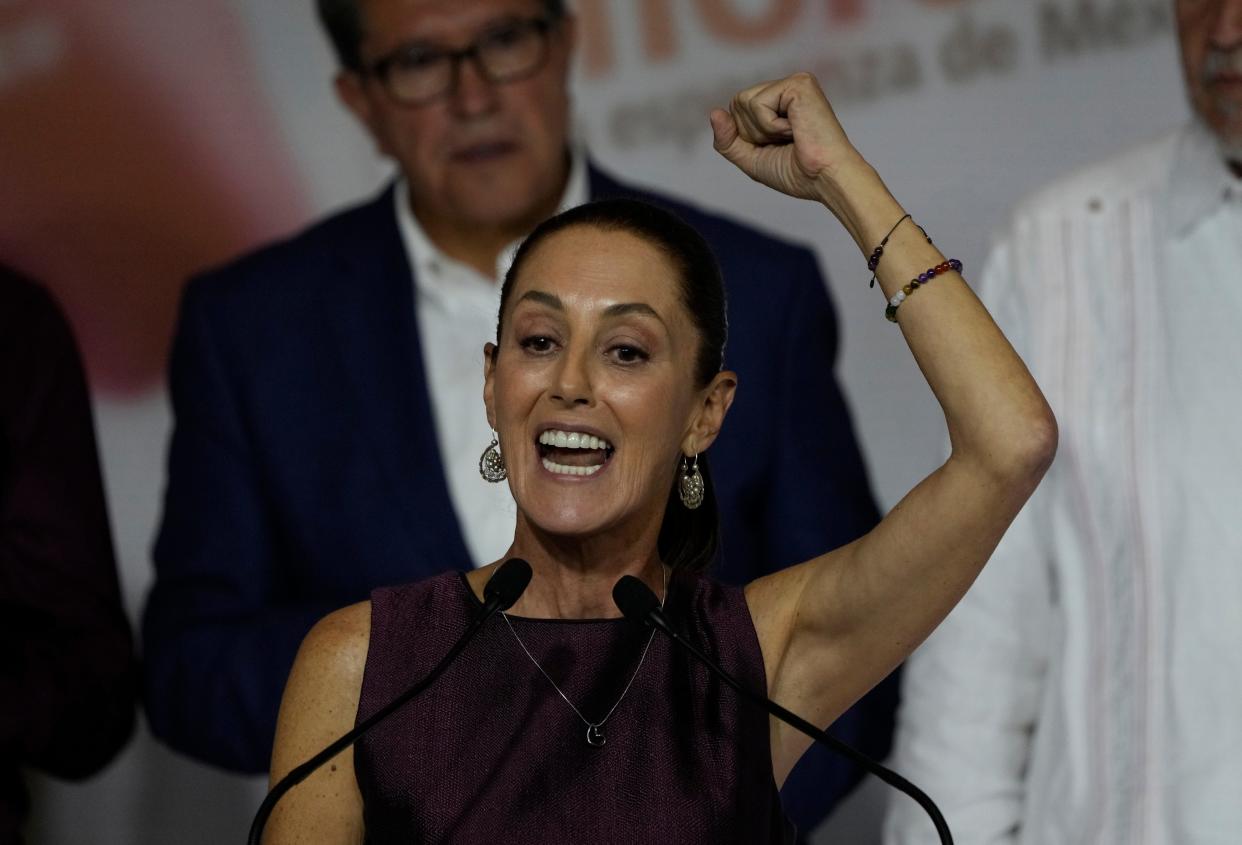Mexico is poised to elect a woman president. How might that impact Americans?

- Oops!Something went wrong.Please try again later.
- Oops!Something went wrong.Please try again later.
- Oops!Something went wrong.Please try again later.
Mexico is poised to beat the United States in electing its first female president, joining the list of Latin American countries that are avant-garde enough to elect a woman to the top job.
One of the two front-runners emerged last week when the ruling party known as Morena picked Claudia Sheinbaum as its candidate in next year’s election to replace outgoing President Andrés Manuel López Obrador.
Sheinbaum, a 61-year-old physicist and former mayor of Mexico City, is the leading contender against Xóchitl Gálvez of the conservative action party known as PAN.
Gálvez, 60, is a federal senator, an engineer and tech entrepreneur with deep Indigenous roots.
Chances are one of these two women will win and take over in October. It’d be a bona fide moment for the country steeped in Indigenous heritage and constant economic and political turmoil since the Spanish conquest.
A female leader would inspire many
Modern-day Mexico is intrinsically linked to the U.S. with its shared 2,000-mile border and the problems and benefits that come with that, including immigration and the $725 billion annual trade of goods and services.
Whatever happens south of the border has repercussions in the United States, whether people here care to admit that or not.
Will a woman president make any difference to America’s political and financial interests south of the border?
Yes, a female leader would undoubtedly spur a powerful and motivational movement among women, the Indigenous population and the poor who would see that anything is possible.
Both these women have earned their way through the political ranks and are now taking Mexico by storm. How they would govern is an open and bigger question.
Sheinbaum is AMLO's protege
Either woman would face a daunting task leading a nation ridden with cartel violence and an increasingly hostile neighbor, where threats of invading Mexico militarily are gaining steam among Republican presidential candidates.
How each got to this moment might indicate how they’d govern and deal with U.S. interests in Mexico.
Sheinbaum is López Obrador’s protégé. Many speculate that she would continue his populist policies of social programs for the poor and share his penchant for “traditional carbon-and-oil energy” over the free market environment that Americans prefer.
Other than reportedly supporting renewable energy sources, Sheinbaum secured his blessing and his party’s backing by standing with the president, also known as AMLO, unconditionally.
A smart move, politically, since his popularity remains high among Mexicans.
In some respects, López Obrador has proven to be a useful tool to America. But he’s also been a constant headache for U.S. business interests in Mexico.
How closely would she follow his lead?
López Obrador has practically done everything that President Trump and now President Biden have asked of him to curtail immigration to the northern border.
Notably, he negotiated a modern free trade agreement between Mexico, the U.S. and Canada.
But he has also set out to undercut it significantly by, for instance, extending state control over electricity, nationalizing lithium and attempting to bar the export of genetically modified agriculture goods such as corn, per various media and academic reports.
That has dampened America’s ambitions of using Mexico to secure all-important supply chains and lessen its dependency on China and other countries.
At the border: If Biden can't stop barbaric buoys, Mexico should
Would Sheinbaum, if elected, follow López Obrador’s footsteps or free herself from his shadow and do her own thing? We don’t know.
Galvez might be more business friendly
That brings us to Gálvez, the senator of the more business-friendly PAN. She is “better known for her knack for political theater than policy gravitas,” Bloomberg reports.
She grew up in extreme poverty with a compelling personal story of a violent alcoholic father. She transformed herself into a successful businesswoman and politician.
She told the Washington Post in August that she decided to run for president to “defend democracy at all costs.”
In the past few months, Gálvez has been gaining notoriety in the U.S. for her stances on immigration and nearshoring.
“Nearshoring is a great opportunity for Mexico as it can generate much more labor,” she told Fox News in July. “Many companies that are coming from Asian countries are technology companies. Therefore, we must invest in a program for Mexican youth and women to study engineering and technical careers.”
Americans eager to use Mexico’s proximity to expand its semiconductor supply chain and everything else from automobiles to electronics must love Gálvez’s vision.
For now, both Gálvez and Sheinbaum have captured Americans’ attention — and rightly so.
Elvia Díaz is editorial page editor for The Arizona Republic and azcentral. Reach her at 602-444-8606 or elvia.diaz@arizonarepublic.com. Follow her on X (formerly Twitter), @elviadiaz1.
This article originally appeared on Arizona Republic: Mexico could elect a woman president. Why that matters to us

